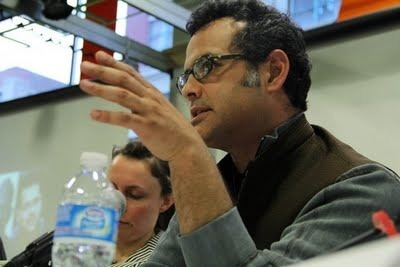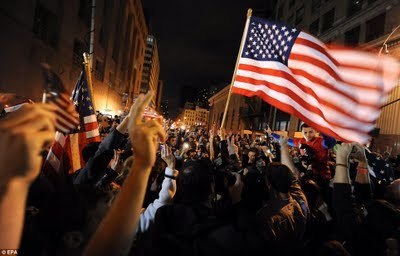Mark Anthony Neal's Blog, page 1088
May 3, 2011
Ambrosia on Late Night with Jimmy Fallon
"How Much I Feel"--One of my favorites
Published on May 03, 2011 19:36
'Left of Black': Episode #31 featuring Aishah Shahidah Simmons & Zaheer Ali
Left of Black #32 w/ Aishah Shahidah Simmons & Zaheer Ali May 2, 2011
Left of Black host and Duke University Professor Mark Anthony Neal is joined via Skype by filmmaker Aishah Shahidah Simmons in a discussion of sexual violence in Black communities, homophobia, and popular culture controversies surrounding Ashley Judd, Kobe Bryant and DJ Mister Cee. Later Neal talks with historian Zaheer Ali, one of the lead researchers on the late Manning Marable's Malcolm X: A Life of Re-invention.
***
→Aishah Shahidah Simmons is an award-winning African-American feminist lesbian independent documentary filmmaker, television and radio producer, published writer, international lecturer, and activist based in Philadelphia, PA. Simmons is the writer, director and producer of NO! the Rape Documentary, a ground-breaking film that explores the issues of sexual violence and rape against Black women and girls.
→Zaheer Ali is a doctoral student in history at Columbia University, where he is focusing his research on twentieth-century African-American history and religion. His dissertation examines the history of the Nation of Islam's Temple/Mosque No. 7 in Harlem, New York. Under the direction of Dr. Manning Marable, he served as project manager and senior researcher of the Malcolm X Project (MXP) at Columbia University, a multi-year research initiative on the life and legacy of Malcolm X and was a lead researcher for Dr. Marable's Malcolm X: A Life of Reinvention (2011), a comprehensive biography on Malcolm X.
***
Left of Black is a weekly Webcast hosted by Mark Anthony Neal and produced in collaboration with the John Hope Franklin Center at Duke University.
Also Available @ iTunes U
Published on May 03, 2011 06:09
Was Bin Laden's Assassination Illegal? Bakari Kitwana Talks with Vijay Prashad
 NewsOne's Bakari Kitwana interviews Vijay Prashad about the implications of the recent killing of Al Qaeda leader Osama Bin Laden. Kitwana and Prashad discuss the American public's euphoria surrounding this news and what this death means for the war in Afghanistan, and the future of America's enemies—from Al Qaeda to the Taliban.
NewsOne's Bakari Kitwana interviews Vijay Prashad about the implications of the recent killing of Al Qaeda leader Osama Bin Laden. Kitwana and Prashad discuss the American public's euphoria surrounding this news and what this death means for the war in Afghanistan, and the future of America's enemies—from Al Qaeda to the Taliban.They also talk about the meaning of Bin Laden's demise to the 2012 presidential race. Says Prashad, "Forget Obama. Forget 2012. What are the long-term implications for American power and authority in a world where others are trying to build up international law as a counter to cowboy-ism?"
Prashad also shares insight on the way he sees the death of Bin Laden already playing out in civil rights and human rights circles: "In 1981 Ronald Reagan signed Executive Order 12333, which disallows the US from pursuing targeted assassinations. Likewise, international law forbids this type of action. I'm very disturbed that there is no qualified discussion about the legality of this type of action. People on the liberal to progressive side seem to have lost their bearings and are no longer able to be serious when it comes to the question of utilizing armed force overseas."
Vijay Prashad is professor and director of International Studies at Trinity College. He is the author eleven books, including his most recent The Darker Nations: A People's History of the Third World.
Bakari Kitwana is CEO of Rap Sessions, Editor at Large of Newsone.com and author of the forthcoming Hip-Hop Activism in the Obama Era. (Third World Press, 2011)
Listen Here
Published on May 03, 2011 05:16
May 2, 2011
No Tears for Osama; No Cheers for US Imperialism

No Tears for Osama; No Cheers for US Imperialism by Mark Anthony Neal | BlackVoices
What struck me initially about the announcement that al-Qaeda founder Osama bin Laden had been killed by United States forces in Pakistan, was the odd framing by mainstream corporate news networks: "This will be one of those moments when people will remember where they were when they heard the news."
Really? Nearly ten-years after bin Laden orchestrated the 9/11 attacks, thousands of American service women and men and tens of thousands of citizens of Afghanistan and Iraq have been killed in the name of what was essentially a pogrom of retribution in the name of American imperialism - and all the mainstream media can do is present this moment as the digital generation's ready-made D-Day?
Let me be clear: I shed no tears for bin Laden, whose murderous beyond-the-State reign, left nothing but death, grief and trauma across multiple continents. But the pursuit of bin Laden was not justification for what has been an escalation of violence and de-stabilization in the Middle East and Northern Africa, by two American Presidents.
As surely as George W. Bush marshaled U.S. military forces in the name of goals motivated as much by political desires as they were motivated by legitimate foreign policy concerns, his successor Barack Obama is complicit in the same desires. The killing of bin Laden is the apex of what the President might described as the "best week ever," particularly after his appearance of Oprah this afternoon (taped and widely speculated on in the blogosphere last week).
Read the Full Essay @ BV
Published on May 02, 2011 14:09
Waking Up in A Post-Osama World
 Waking Up in A Post-Osama World
by Mark Naison | Fordham University
Waking Up in A Post-Osama World
by Mark Naison | Fordham UniversityI hope that those who lost loved ones on 9/11 feel some sense of closure from the death of Osama Bin Laden.
I know I am supposed to feel like celebrating, but I just feel a deep sense of sadness as I grapple with a flood of memories from the day the planes flew into the World Trade Center and the events that followed.
Watching the twin towers fall from the 6th Floor seminar room of Dealy Hall at Fordham, with students and colleagues, wondering how many people had died, and worrying if my daughter and son-in-law, both of whom worked downtown, were safe.
Driving back to Brooklyn across the Whitestone Bridge with tears in my eyes as I watched smoke pour out of the rubble where the twin towers once had been, a trip that I would not be able to take without crying for the next three months.
Getting home to discover that my daughter and son-in-law were safe, but that my wife, an elementary school principal would be staying long into the night to comfort a traumatized student population and staff, some of whom had loved one's missing.
Joining more than 10,000 people in Park Slope in a march from my wife's elementary school to the local firehouse, to create a memorial to the nine people in the local rescue company who died in the Twin Towers trying to save the lives of others.
Learning that three of the men I had coached against in CYO basketball for more than five years, firefighters all, had died that awful day, not being surprised at all that they had given their lives for others because when you are a fire fighter who grew up in Brooklyn that's what you do.
Driving to and from work through Crown Heights, Brownsville and East New York and seeing American flags hanging from apartment windows and being displayed on cars in neighborhoods where I had never seen them before and realizing that this attack had united working class New Yorkers like nothing in my lifetime.
Sitting in my office with tears in my eyes playing a song by Travis Tritt called " It's a Great Day to Be Alive" and trying to convince myself that was, in fact, the case.
Feeling incredibly proud of how my fellow New Yorkers had come together to save lives and comfort one another during and after this unspeakable tragedy and wondering whether people around the country had a clue about who we were and why we could respond the way we did.
Now it is nearly eleven years later and the man who plotted this attack is dead, killed by American commandos.
If there is a lesson in all this, I am not sure what it is.
Meanwhile, I mourn those who died, in the attack and the wars that followed, and feel love and gratitude for my fellow New Yorkers, both those who made the ultimate sacrifice that fateful day and all of those who came together in solidarity after the damage was done to heal and ultimately rebuild a wounded city.
***
Mark Naison is a Professor of African-American Studies and History at Fordham University and Director of Fordham's Urban Studies Program. He is the author of two books, Communists in Harlem During the Depression and White Boy: A Memoir. Naison is also co-director of the Bronx African American History Project (BAAHP). Research from the BAAHP will be published in a forthcoming collection of oral histories Before the Fires: An Oral History of African American Life From the 1930s to the 1960s.
Published on May 02, 2011 05:41
May 1, 2011
Apple's Chinese Workers Treated 'Inhumanely, like machines'

Investigation finds evidence of draconian rules and excessive overtime to meet western demand for iPhones and iPads.
Apple's Chinese Workers Treated 'Inhumanely, like machines' by Gethin Chamberlain | The Guardian
An investigation into the conditions of Chinese workers has revealed the shocking human cost of producing the must-have Apple iPhones and iPads that are now ubiquitous in the west.
The research, carried out by two NGOs, has revealed disturbing allegations of excessive working hours and draconian workplace rules at two major plants in southern China. It has also uncovered an "anti-suicide" pledge that workers at the two plants have been urged to sign, after a series of employee deaths last year.
The investigation gives a detailed picture of life for the 500,000 workers at the Shenzhen and Chengdu factories owned by Foxconn, which produces millions of Apple products each year. The report accuses Foxconn of treating workers "inhumanely, like machines".
Among the allegations made by workers interviewed by the NGOs – the Centre for Research on Multinational Corporations and Students & Scholars Against Corporate Misbehaviour (Sacom) – are claims that:
Read the Full Essay @ The Guardian
Published on May 01, 2011 16:41
The High Cost of Low Teacher Salaries

The High Cost of Low Teacher Salaries by Dave Eggers and Nínive Clements Calegari | from The New York Times
When we don't get the results we want in our military endeavors, we don't blame the soldiers. We don't say, "It's these lazy soldiers and their bloated benefits plans! That's why we haven't done better in Afghanistan!" No, if the results aren't there, we blame the planners. We blame the generals, the secretary of defense, the Joint Chiefs of Staff. No one contemplates blaming the men and women fighting every day in the trenches for little pay and scant recognition.
And yet in education we do just that. When we don't like the way our students score on international standardized tests, we blame the teachers. When we don't like the way particular schools perform, we blame the teachers and restrict their resources.
Compare this with our approach to our military: when results on the ground are not what we hoped, we think of ways to better support soldiers. We try to give them better tools, better weapons, better protection, better training. And when recruiting is down, we offer incentives.
We have a rare chance now, with many teachers near retirement, to prove we're serious about education. The first step is to make the teaching profession more attractive to college graduates. This will take some doing.
At the moment, the average teacher's pay is on par with that of a toll taker or bartender. Teachers make 14 percent less than professionals in other occupations that require similar levels of education. In real terms, teachers' salaries have declined for 30 years. The average starting salary is $39,000; the average ending salary — after 25 years in the profession — is $67,000. This prices teachers out of home ownership in 32 metropolitan areas, and makes raising a family on one salary near impossible.
So how do teachers cope? Sixty-two percent work outside the classroom to make ends meet. For Erik Benner, an award-winning history teacher in Keller, Tex., money has been a constant struggle. He has two children, and for 15 years has been unable to support them on his salary. Every weekday, he goes directly from Trinity Springs Middle School to drive a forklift at Floor and Décor. He works until 11 every night, then gets up and starts all over again. Does this look like "A Plan," either on the state or federal level?
We've been working with public school teachers for 10 years; every spring, we see many of the best teachers leave the profession. They're mowed down by the long hours, low pay, the lack of support and respect.
Imagine a novice teacher, thrown into an urban school, told to teach five classes a day, with up to 40 students each. At the year's end, if test scores haven't risen enough, he or she is called a bad teacher. For college graduates who have other options, this kind of pressure, for such low pay, doesn't make much sense. So every year 20 percent of teachers in urban districts quit. Nationwide, 46 percent of teachers quit before their fifth year. The turnover costs the United States $7.34 billion yearly. The effect within schools — especially those in urban communities where turnover is highest — is devastating.
But we can reverse course. In the next 10 years, over half of the nation's nearly 3.2 million public school teachers will become eligible for retirement. Who will replace them? How do we attract and keep the best minds in the profession?
People talk about accountability, measurements, tenure, test scores and pay for performance. These questions are worthy of debate, but are secondary to recruiting and training teachers and treating them fairly. There is no silver bullet that will fix every last school in America, but until we solve the problem of teacher turnover, we don't have a chance.
Can we do better? Can we generate "A Plan"? Of course.
The consulting firm McKinsey recently examined how we might attract and retain a talented teaching force. The study compared the treatment of teachers here and in the three countries that perform best on standardized tests: Finland, Singapore and South Korea.
Turns out these countries have an entirely different approach to the profession. First, the governments in these countries recruit top graduates to the profession. (We don't.) In Finland and Singapore they pay for training. (We don't.) In terms of purchasing power, South Korea pays teachers on average 250 percent of what we do.
And most of all, they trust their teachers. They are rightly seen as the solution, not the problem, and when improvement is needed, the school receives support and development, not punishment. Accordingly, turnover in these countries is startlingly low: In South Korea, it's 1 percent per year. In Finland, it's 2 percent. In Singapore, 3 percent.
McKinsey polled 900 top-tier American college students and found that 68 percent would consider teaching if salaries started at $65,000 and rose to a minimum of $150,000. Could we do this? If we're committed to "winning the future," we should. If any administration is capable of tackling this, it's the current one. President Obama and Education Secretary Arne Duncan understand the centrality of teachers and have said that improving our education system begins and ends with great teachers. But world-class education costs money.
For those who say, "How do we pay for this?" — well, how are we paying for three concurrent wars? How did we pay for the interstate highway system? Or the bailout of the savings and loans in 1989 and that of the investment banks in 2008? How did we pay for the equally ambitious project of sending Americans to the moon? We had the vision and we had the will and we found a way.
Dave Eggers and Nínive Clements Calegari are founders of the 826 National tutoring centers and producers of the documentary "American Teacher."
Published on May 01, 2011 13:10
The Signifying (President)
President Obama speaks at the annual White House Correspondents' Dinner.
Published on May 01, 2011 10:23
President Obama Makes Jokes, But is Not Laughing
President Obama speaks at the annual White House Correspondents' Dinner.
Published on May 01, 2011 10:23
April 30, 2011
Trailer: Everywhere and Nowhere (a film by Menhaj Huda)
shout to Stella Nwimo
Published on April 30, 2011 09:20
Mark Anthony Neal's Blog
- Mark Anthony Neal's profile
- 30 followers
Mark Anthony Neal isn't a Goodreads Author
(yet),
but they
do have a blog,
so here are some recent posts imported from
their feed.



